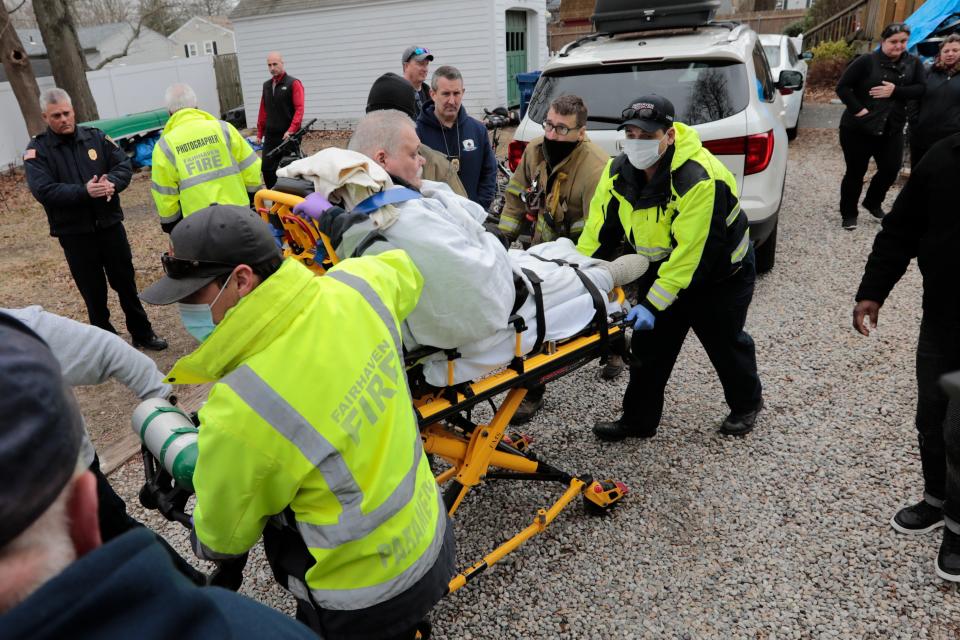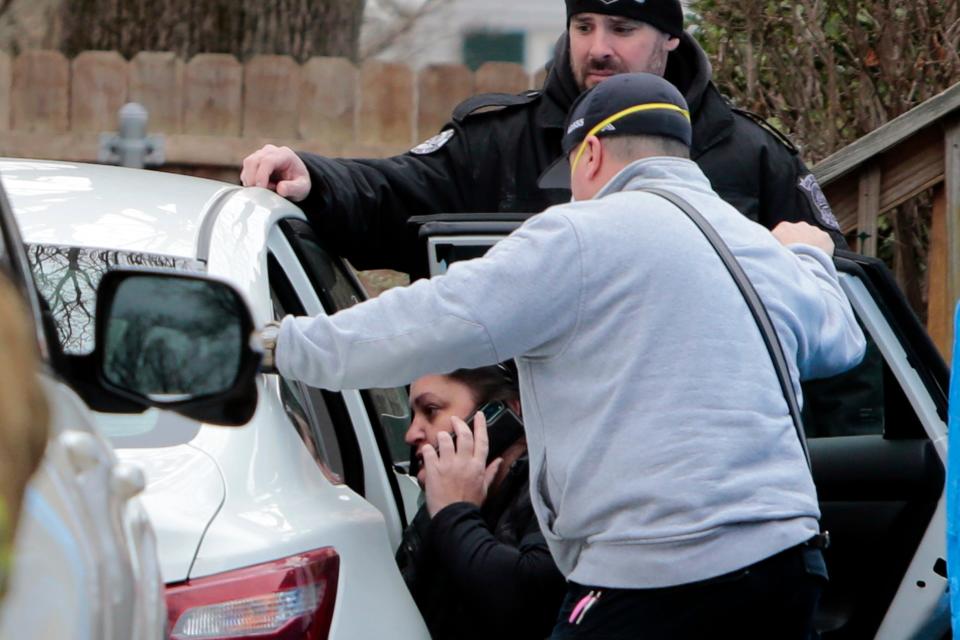Tracking program a lifesaver for families with at-risk individuals
- Oops!Something went wrong.Please try again later.
Taunton mom Teresa Gomes must take precautions to keep her 14-year-old son safe. Being on the autism spectrum and non-verbal, she said he can be very impulsive, prone to bolting and running away.
“He’s gone missing before,” she said, citing an incident years prior when, while living in an apartment at Cohannet Village, he ran off.
He was found later that day in another building, with many police officers, K-9 dogs, and neighbors searching for him.
Gomes had no way of tracking her son's whereabouts when he went missing. After learning about a tracking program from an acquaintance, Gomes registered her son with Project Lifesaver.
In the five years he has been registered with the program, Gomes said it has never been needed. But she finds comfort knowing it is always secure on her son if an incident was to occur.

Project Lifesaver (PLS) is a rapid response and locating system used nationwide by public safety agencies and caregivers. Tracking bracelets with radio frequencies are placed on at-risk individuals, like those with autism, Down syndrome, or seniors suffering from dementia or Alzheimer’s, who are prone to wandering.
When one of its users go missing, emergency response can track the transmitter in the bracelet. According to Project Lifesaver's website, on average, those missing are found within 30 minutes once the bracelet is activated.
Until recently, the Bristol County Sheriff’s Office oversaw the program in the region. As of June 30, the office ceased its involvement with the program, a decision that has left users worried and other regional agencies scrambling to keep it going.
“It’s really not great for us if it was cancelled,” said Gomes.
The program will not however be cancelled. The Taunton Police Department has agreed to temporarily house the program until a more permanent solution is decided.

Start of the program
Since 2006, the Bristol County Sheriff’s Office has overseen Project Lifesaver including equipment maintenance, user registration, and managing the database of users across the county, which includes each individual bracelet number and transmitter frequency, which are crucial to searches.
Maintenance also involves an officer traveling to the users’ homes every one to two months to test the bracelets and change the batteries. The officer overseeing PLS also assisted with search and rescue if needed.
Beer, flights, margaritas: Enjoy a drink with a view at these 5 Taunton restaurants
Temporary solution
Currently, the database of PLS users in Bristol County is temporarily being housed with the Taunton Police Department.
Eric Nichols, administrative lieutenant for Taunton Police, and unit commander for the Search and Rescue Division for the Southeastern Massachusetts Law Enforcement Council (SEMLEC) – the team that gets the call for every PLS missing person case in its coverage area – explained that Taunton Police stepped up as soon as the Sheriff’s Office ceased involvement.
“At no time has there been a lack of coverage, as the Taunton Police Department has been monitoring the dashboard continuously and working alongside SEMLEC in the event an individual has gone missing,” said Nichols.

Project Lifesaver throughout the region
Local public safety agencies in Bristol County and/or near the Greater Taunton area have individual Project Lifesaver programs, such as Rehoboth, Mansfield, Attleboro, Middleboro, and Easton, but still coordinated with the Sheriff’s Office for its role in maintenance and managing tracking information.
“We are absolutely continuing the program. We are working out the details as we speak but there will be no interruptions in service for the Mansfield residents who still have Project Lifesaver units,” said Mansfield Fire Chief Justin Desrosiers, adding that his program is also available for mutual aid for search and rescue when needed.
Sergeant James Casey of the Rehoboth Police Department said its PLS program can accommodate the testing and battery-changing for the bracelets of its community’s users, if need be. “As of right now, there’s not much of a negative impact,” said Casey, who is also a member of SEMLEC’s Search and Rescue Division.
Bristol County's top 100 salaries: Correctional officers pulled in major overtime in 2022
According to Bristol County Sheriff’s Office Chief of Staff Owen Bebeau, 54 users across Bristol County are registered with Project Lifesaver as of June 30, 2023. A breakdown of members by community includes: Assonet, 1; Attleboro, 2; Dartmouth, 4; Easton, 3; Fairhaven, 1; Fall River, 6; Freetown, 3; Lakeville, 1; Mansfield, 1; New Bedford, 4; North Attleboro, 1; Norton, 1; Raynham, 7; Rehoboth, 2; Seekonk, 1; Somerset, 3; Swansea, 3; Taunton, 9; Westport, 1.
Why the Sheriff's Office is no longer overseeing the program
Back in April, Bristol County Sheriff Paul Heroux announced at his “100 days in office” press conference he would redirect more funds, staff, and resources inward towards improving operations at its corrections facilities.
“I campaigned on running a jail. This is beyond the scope of running a jail,” said Heroux.
$1.5 million in office-run community programs, including Project Lifesaver, were reallocated in order to focus on staff training and rehabilitation for inmates, with the goal of reducing recidivism.
Heroux said the cost to the Sheriff’s Office was a little over $80,000 annually for the officer to oversee PLS.
Sheriff Heroux emphasized “the need for this is important,” but “it wasn’t a good use of resources” keeping it under the umbrella of the Sheriff’s Office.
How does Project Lifesaver work
Registered users pay $300 for the tracking bracelet, as well as a $10 bi-monthly fee, which included staff visiting users for regular testing and changing of the batteries.
“Every day, any child out there without this project is at risk,” said John Santarpia, co-founder of Dreams for Emily, a Taunton-based non-profit that advocates and fundraises for, among other things, assistance and programming for families caring for members with autism.
Dreams for Emily has worked to register families with Project Lifesaver by paying for the cost of the bracelet, with the family taking care of the bi-monthly fee.
Teresa Gomes signed up for Project Lifesaver through Dreams for Emily.
What are alternatives
Sheriff Heroux considers the technology used by Project Lifesaver “a terribly antiquated option.”
He recommends families use Apple air tags as an effective and less expensive alternative for tracking loved ones. But neither Apple or local law enforcement officials recommend using air tags for tracking individuals.
Apple markets its air tags for helping find missing objects like luggage, keys, wallets, and backpacks. When reached for comment, media relations for Apple declined to go on the record as to whether it condones using air tags for tracking people. An Apple Support page on using air tags states “AirTag, AirPods, and other Find My network accessories include features to guard against unwanted tracking. They should not be used to track people, and should not be used to track property that does not belong to you.”
Gene Saunders, founder and CEO of Project Lifesaver, said “absolutely not” to the suggestion that Apple air tags work just as well or better than Project Lifesaver, saying air tags use Bluetooth to communicate, which can be unreliable in open spaces and rural settings.
Lieutenant Nichols from SEMLEC said radio frequency-based (RF) locating technology, like Project Lifesaver, is “the more popular approach in the search and rescue world,” compared to other tech, like GPS and bluetooth. While other tracking options have far greater range, RF is more accurate and works better in buildings, he said.
The future of Project Lifesaver in Bristol County
Currently, different agencies are trying to determine the best permanent solution.
Robert Verdone, executive director for the Southeastern Massachusetts Regional 911 District, said its agency is looking into taking over the Bristol County Sheriff’s Office’s former duties with Project Lifesaver, at least for the communities it is currently serving. “It’s up in the air as to how we’re going to facilitate the maintenance side of Project Lifesaver. We are finding a solution to fill that gap.”
In the meantime, Verdone said his agency is increasing training options across the district for operating and maintaining Project Lifesaver.
Regarding the rest of the county, “solutions are currently being explored in Bristol County with the hope of the program being continued by another agency that will oversee it long term,” said Whitman Police Chief Timothy Hanlon, who also serves as control chief for SEMLEC’s Search and Rescue.
Taunton Mayor Shaunna O’Connell added, “We anticipate that Project Lifesaver will continue under new leadership, but the details are not yet finalized. Taunton residents will not lose access to the services they need and we will announce further details as soon as we can."
Lieutenant Nichols emphasized that all police chiefs in Bristol County are aware of Taunton Police Department's control over the program, so families registered with Project Lifesaver should still follow established protocol for an emergency and call 911.
Nichols added SEMLEC and Taunton Police have been in contact with Project Lifesaver for assistance with changing batteries for the tracking bracelets. Any families who need batteries changed should call their local police department, who will get in contact with staff currently overseeing the program.
Signing up for Project Lifesaver
Families in Bristol County interested in learning more about Project Lifesaver or obtaining a tracking bracelet for a loved one, are encouraged to call their local police department non-emergency line for more information. There they will be connected with the person overseeing new registrations. Visit the Project Lifesaver website for more information on the program and the technology.
This article originally appeared on The Taunton Daily Gazette: Bristol County agencies trying to find new home for Project Lifesaver

